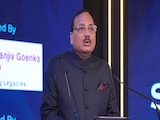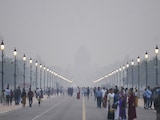A general view shows the rally of Tsai Ing-wen, presidential candidate for Taiwan's main opposition Democratic Progressive Party (DPP), in southern Kaohsiung on January 9, 2016. (AFP photo)
Taipei:
Tens of thousands gathered in Taiwan Saturday as rival presidential candidates took to the streets for "super weekend" rallies.
It is the last weekend of campaigning before the vote for president next Saturday, when the embattled ruling Kuomintang (KMT) is expected to be defeated.
Tsai Ing-wen of the main opposition Democratic Progressive Party (DPP) is forecast to take the leadership as the KMT struggles for public support, due to scepticism over its China-friendly policies and anger at the island's stagnating economy.
The KMT says if Tsai wins, the recent rapprochement with Beijing will be over, destabilising the region.
But addressing crowds gathered for her rally in the city of Kaohsiung, southern Taiwan, the DPP's heartland, Tsai said change was the only way forward.
"Taiwan will only improve if the DPP has the majority," she said.
"I will lead Taiwan towards reform, I will lead Taiwan towards change."
The DPP said turnout was 100,000, with supporters waving flags, chanting Tsai's name and blowing horns.
"I support Tsai Ing-wen because she brings fresh ideas," said service industry worker Gladys Cheng, 27.
"Even if cross-strait relations aren't good, I don't think it matters so much. The focus should be global, not just on China."
Despite lagging Tsai in the polls, KMT candidate Eric Chu managed to garner massive crowds on the streets of Taipei Saturday afternoon, with the party saying 200,000 turned out for his rally.
Chu walked alongside current president Ma Ying-jeou in a march through the centre of the city as supporters donned fancy dress, waved the national flag, and held up "Victory" signs.
Chu has emphasised the importance of peaceful relations with China throughout his campaign.
"We are marching together for Taiwan's stability," he told the crowds.
"No matter how much dissatisfaction you felt in the past, be brave, stand out and vote for our next generation," he said.
Chu's supporters said they were afraid the DPP would bring instability.
"The DPP is pro-independence and I worry tensions will rise with China if it were to take power," said supporter Peng Yu-chia, 45, a housewife with two children.
'New politics'
Taiwan is self-ruling after it split from China in 1949 following a civil war on the mainland, but Beijing still considers it part of its territory, awaiting reunification.
Ma has overseen a rapprochement with China since he took power in 2008, leading to trade deals and a tourist boom, and culminating in a historic summit with Chinese President Xi Jinping.
But many voters feel it is big business that has reaped the benefits, not ordinary people, and there are growing concerns over Beijing's influence.
Anger over trade deals with China sparked the student-led occupation of parliament in 2014 in what became known as the Sunflower Movement.
Some activists are now running for office in parliamentary elections, held on the same day as the presidential vote.
The New Power Party (NPP), which grew out of the Sunflower Movement, held a rally in Taipei Saturday night, drawing more than 1,000 people.
"Today is a critical time for the start of new politics in Taiwan" said party chairman and former protest leader Huang Kuo-chang.
"As long as we insist on our ideals, we can bring justice to parliament."
The KMT may lose its parliamentary majority for the first time ever.
Presidential candidate James Soong, trailing in the polls, also held a rally in the central city of Taichung Saturday evening, drawing around 10,000 supporters.
Soong, of the Beijing-friendly People First Party, criticised the confrontation between the DPP and KMT as damaging to the economy.
It is the last weekend of campaigning before the vote for president next Saturday, when the embattled ruling Kuomintang (KMT) is expected to be defeated.
Tsai Ing-wen of the main opposition Democratic Progressive Party (DPP) is forecast to take the leadership as the KMT struggles for public support, due to scepticism over its China-friendly policies and anger at the island's stagnating economy.
The KMT says if Tsai wins, the recent rapprochement with Beijing will be over, destabilising the region.
But addressing crowds gathered for her rally in the city of Kaohsiung, southern Taiwan, the DPP's heartland, Tsai said change was the only way forward.
"Taiwan will only improve if the DPP has the majority," she said.
"I will lead Taiwan towards reform, I will lead Taiwan towards change."
The DPP said turnout was 100,000, with supporters waving flags, chanting Tsai's name and blowing horns.
"I support Tsai Ing-wen because she brings fresh ideas," said service industry worker Gladys Cheng, 27.
"Even if cross-strait relations aren't good, I don't think it matters so much. The focus should be global, not just on China."
Despite lagging Tsai in the polls, KMT candidate Eric Chu managed to garner massive crowds on the streets of Taipei Saturday afternoon, with the party saying 200,000 turned out for his rally.
Chu walked alongside current president Ma Ying-jeou in a march through the centre of the city as supporters donned fancy dress, waved the national flag, and held up "Victory" signs.
Chu has emphasised the importance of peaceful relations with China throughout his campaign.
"We are marching together for Taiwan's stability," he told the crowds.
"No matter how much dissatisfaction you felt in the past, be brave, stand out and vote for our next generation," he said.
Chu's supporters said they were afraid the DPP would bring instability.
"The DPP is pro-independence and I worry tensions will rise with China if it were to take power," said supporter Peng Yu-chia, 45, a housewife with two children.
'New politics'
Taiwan is self-ruling after it split from China in 1949 following a civil war on the mainland, but Beijing still considers it part of its territory, awaiting reunification.
Ma has overseen a rapprochement with China since he took power in 2008, leading to trade deals and a tourist boom, and culminating in a historic summit with Chinese President Xi Jinping.
But many voters feel it is big business that has reaped the benefits, not ordinary people, and there are growing concerns over Beijing's influence.
Anger over trade deals with China sparked the student-led occupation of parliament in 2014 in what became known as the Sunflower Movement.
Some activists are now running for office in parliamentary elections, held on the same day as the presidential vote.
The New Power Party (NPP), which grew out of the Sunflower Movement, held a rally in Taipei Saturday night, drawing more than 1,000 people.
"Today is a critical time for the start of new politics in Taiwan" said party chairman and former protest leader Huang Kuo-chang.
"As long as we insist on our ideals, we can bring justice to parliament."
The KMT may lose its parliamentary majority for the first time ever.
Presidential candidate James Soong, trailing in the polls, also held a rally in the central city of Taichung Saturday evening, drawing around 10,000 supporters.
Soong, of the Beijing-friendly People First Party, criticised the confrontation between the DPP and KMT as damaging to the economy.















